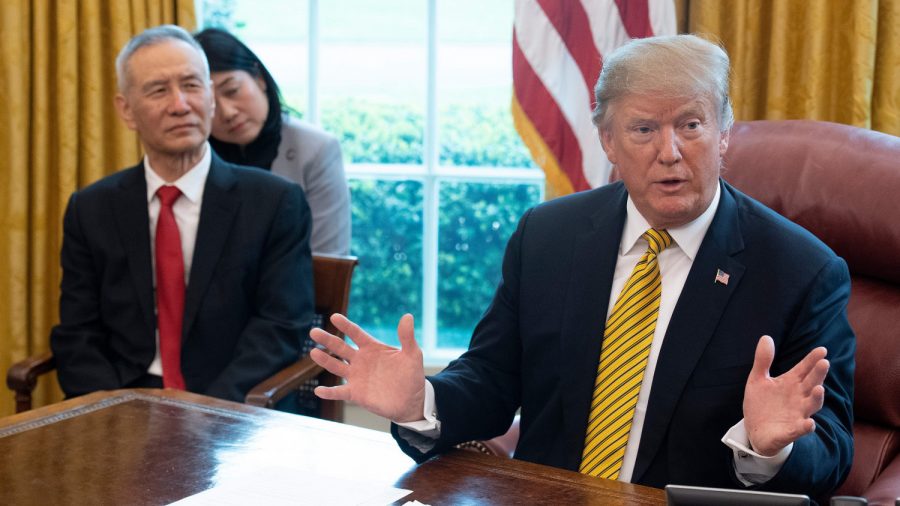China’s Vice Premier Liu He will arrive in Washington on May 9 for another round of U.S.–China trade talks, arriving one day later than scheduled.
China’s Ministry of Commerce confirmed via an announcement on its website on May 7: “Accepting the invitation from U.S. Trade Representative Robert Lighthizer and Treasury Secretary Steven Mnuchin, Chinese Communist Party Politburo member Liu He, who is also vice premier and chief negotiator in the U.S.–China trade talks, will visit the United States on May 9 and 10 for the 11th round of consultations with the U.S. delegation.”
This official announcement is different from previous announcements in which Liu was also named a special envoy of Chinese leader Xi Jinping. This change suggests that Liu would not be making the final decision while in Washington.

There was some speculation that Liu might not make the trip after President Donald Trump wrote on Twitter on May 5 that after slow progress on talks, he would increase tariffs on $200 billion worth of Chinese goods from 10 percent to 25 percent beginning May 10, and impose duties “shortly” on $325 billion of currently untaxed Chinese goods.
Disagreements
Iris Pang, an economist at ING, wrote in an analysis on May 7 that Liu’s visit signals “how serious China [the Chinese government] is and indicates that China and the U.S. are going to talk further.”
Lighthizer hinted at what could have caused Trump’s surprise announcement. During a briefing with reporters on May 6, he said China was “reneging on prior commitments” after 10 rounds of talks.
Investor’s Business Daily similarly reported on May 7 that Lighthizer said the Chinese side “diluted pledged measures to end forced technology transfer and limit state subsidies.”
Furthermore, Beijing disagreed with Trump’s plan to “keep some tariffs in place, perhaps through 2020.”
Stimulus Measures
Trump’s May 5 announcement caused Chinese stocks to plummet.
The People’s Bank of China (PBOC), China’s central bank, quickly published a statement on May 6 that it would lower the required reserve ratio of smaller rural banks to divert more liquidity to small, private companies, beginning May 15.
The Hong Kong Monetary Authority then announced on May 7 that the PBOC will issue a total of 20 billion yuan ($2.95 billion) of treasury bills out of Hong Kong from May 15 to May 17.
It also said 10 billion yuan ($1.48 billion) of the bills are for a three-month loan period, and the other 10 billion yuan are in one-year loans.
This will be the third time since November 2018 that the PBOC has issued treasury bills in Hong Kong, the world’s biggest offshore yuan clearing center. By issuing treasury bills, the PBOC can prevent the yuan exchange rate from falling.
Pang had noted in her analysis that whether “China will speed up fiscal stimulus and continue with more monetary easings” would be a sign of whether China plans a tougher, longer path to negotiations with the United States.
Frank Tian Xie, a business professor at the University of South Carolina–Aiken, told New York-based broadcaster NTD in a May 6 interview that the stimulus measures are to protect the Chinese leadership’s rule: “The Chinese regime realizes that it will lose control of the economy if it executes the concessions made during the trade talks. Then the Party officials who enjoy profits from the current economic system will lose their interests, and will be extremely against [Xi and his leadership].”
Xie ultimately believed that the Chinese regime would not meet the U.S. demands, because “the Party would never allow itself to lose its grasp over the economy, even if the outcome [of a trade dispute with the United States] would damage the currently fragile economy.”
From The Epoch Times


